Public School Magazine, September 1901
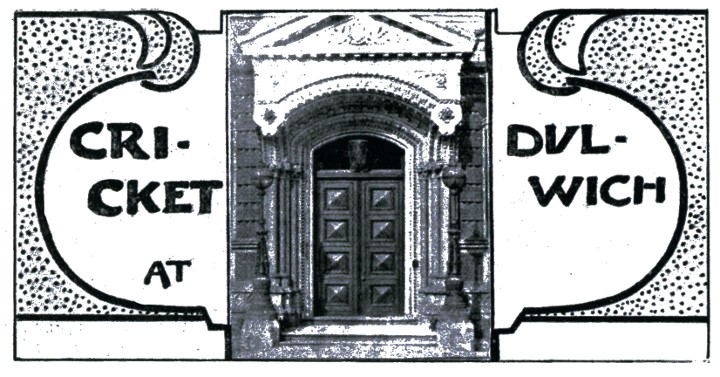
IN
view of the complete changes which have taken place this season in the
system of Dulwich cricket, the present time is particularly suitable for
an article on the subject. Hitherto the games have been arranged, as far
as possible, with a view to individual merit. Thus, every player in game
three, for instance, was supposed (frequently without the least justice)
to be a sounder all-round cricketer than any given member of game four.
It was, of course, impossible at the beginning of the season to avoid
mistakes, with the result that occasionally some Triton, being placed
among minnows, would follow up a lively century with an equally fine
bowling performance. This was certainly pleasant for him, but struck the
other members of the game as being far from good enough. He would stay in
that game perhaps for a fortnight, after which he would be moved up one.
After a couple of months or so, that is, just as the season came to an end,
he would be moved into the game where he ought to have been from the
beginning. Then the cup matches would begin, and the half-holiday games
cease. When colours were distributed this player would, in all probability,
receive his Third Eleven cap on the strength of his scores in the earlier part
of the season, though in reality quite a mediocre cricketer. The natural
result of this system was to make everybody play for himself instead of for
his side, while the loafing element for the most part contrived, by means of
parents’ notes of excuse, or some such other base practice, to eschew the
games altogether. Thus every half-holiday would find a frenzied game-captain
trying his best to manufacture a game out of three players on one side and
two on the other. In the end he would be forced to amalgamate with the game
above or below him, much to the disgust of his own game in the former case,
and the other game in the latter. A few such experiences were enough to damp
the ardour of the keenest, and it is a wonder that under such circumstances
cricket did not die out altogether. This was probably prevented by the
fact that the upper games were generally well attended, while the inter-form
and inter-house cup matches always produced very keen struggles. This
state of things continued more or less till the present year, when, under
the able leadership of T. E. Gullick, a reformed system was instituted.
Instead of the customary eight senior games, there are, firstly, three
team games, playing either card-matches or scratch-matches, and a
next-sixteen game. The rest of the School—this is where the special
advantage of the system is to come in—will play in Forms, and the residuum,
if any, are collected into one or, perhaps, two games. Considered merely
from a theoretical point of view no system could be much better than
this. Practical difficulties may arise (or may, by the time these lines
appear in print, have arisen and been settled), but there can be no doubt
that the new arrangement will be found a great improvement on the old. For
one thing, it will tend to make a player play for his side. Under the
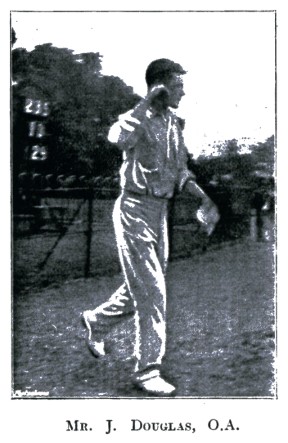 former arrangement of games it was too much to expect anybody to do that.
One was satisfied if they played at all, and the game-captain, having seen
his game started and to all outward seeming a going concern, went off
himself to play for the First Eleven against Mr. Douglas’ team, or for
the Second in a card-match, with the gratifying feeling that his duty had
been done. And meanwhile the game, nominally in charge of the captain of
each side, ran itself, and the captain would undertake the trundling at
one end, and the captain’s particular friend at the other, and umpires
stood like Patiences on Monuments, smiling at the grief of seeing their
chances of an innings fading away, as the two men in grew more and more
set. And when one of the batsmen finally got out (umpired out probably),
he would rush to see how many he had made, and find that the scorer had
got tired of it long ago, and had gone home to tea. And the next
half-holiday he would stay at home and play ping-pong with his little
brother. And there would be another young man gone wrong.
former arrangement of games it was too much to expect anybody to do that.
One was satisfied if they played at all, and the game-captain, having seen
his game started and to all outward seeming a going concern, went off
himself to play for the First Eleven against Mr. Douglas’ team, or for
the Second in a card-match, with the gratifying feeling that his duty had
been done. And meanwhile the game, nominally in charge of the captain of
each side, ran itself, and the captain would undertake the trundling at
one end, and the captain’s particular friend at the other, and umpires
stood like Patiences on Monuments, smiling at the grief of seeing their
chances of an innings fading away, as the two men in grew more and more
set. And when one of the batsmen finally got out (umpired out probably),
he would rush to see how many he had made, and find that the scorer had
got tired of it long ago, and had gone home to tea. And the next
half-holiday he would stay at home and play ping-pong with his little
brother. And there would be another young man gone wrong.
There is no more terrible spectacle than a cricket-match where each
individual is playing for himself, and if the new system is likely to alter
such a state of things, then, whatever its flaws, it should be encouraged.
The reason why a player will play more keenly in a Form match than in a
game is to be explained by the fact that at Dulwich, where there are only
four boarding-houses, the rivalry, which at other Schools exists between
the Houses, is concentrated on the Forms. The House matches are, both at
cricket and football, the keenest games, except for First Eleven and Fifteen
fixtures, but the interest of the School, as a whole, centres on the Forms.
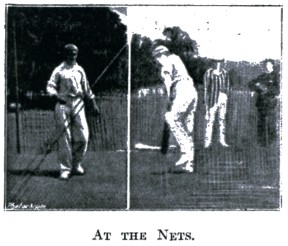 Moreover, as a cup will be given at the end of the season to the winning
Form in this league, competition should be very keen. In the regular cup
matches the Forms are divided into two divisions, each of which has its
cup. The entry for the first division is generally small. Last year it
included the Classical Sixth, the Classical Remove, the Modern Sixth,
Engineers I., and the Science Sixth. The matches go on from day to day until
each side has had its two innings. Sometimes a match will last a week or
more. One of the features of the Dulwich cricket season is Founder’s Day,
the Saturday nearest the 20th of June. On this day the Old Boys’ matches
are played, four in number. On Ascension Day there is a College Service in
the morning, and the rest of the day is given up to cricket. It is quite the
best day (if fine) in the whole season, an additional interest being given
by the fact that each of the matches is an annual fixture. Cricket at
Dulwich is usually noteworthy for the smallness of the scoring. On the clay
soil the bowlers generally have it all their own way. The vagaries of the
climate are calculated to upset the stoutest of ground-men. In the earlier
part of the week the ground is so parched that the wicket for the
Saturday’s match has to be kept constantly supplied with water. Then
the rain begins to come down on Thursday evening, and continues steadily
till Saturday morning, when a hot sun again appears. The result is that
the bowling averages produce some really good figures, but the batting
averages are usually low.
Moreover, as a cup will be given at the end of the season to the winning
Form in this league, competition should be very keen. In the regular cup
matches the Forms are divided into two divisions, each of which has its
cup. The entry for the first division is generally small. Last year it
included the Classical Sixth, the Classical Remove, the Modern Sixth,
Engineers I., and the Science Sixth. The matches go on from day to day until
each side has had its two innings. Sometimes a match will last a week or
more. One of the features of the Dulwich cricket season is Founder’s Day,
the Saturday nearest the 20th of June. On this day the Old Boys’ matches
are played, four in number. On Ascension Day there is a College Service in
the morning, and the rest of the day is given up to cricket. It is quite the
best day (if fine) in the whole season, an additional interest being given
by the fact that each of the matches is an annual fixture. Cricket at
Dulwich is usually noteworthy for the smallness of the scoring. On the clay
soil the bowlers generally have it all their own way. The vagaries of the
climate are calculated to upset the stoutest of ground-men. In the earlier
part of the week the ground is so parched that the wicket for the
Saturday’s match has to be kept constantly supplied with water. Then
the rain begins to come down on Thursday evening, and continues steadily
till Saturday morning, when a hot sun again appears. The result is that
the bowling averages produce some really good figures, but the batting
averages are usually low.
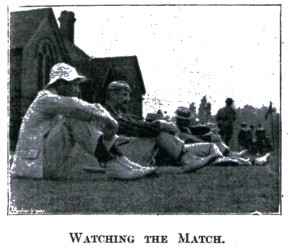
Together with the games-reform has come an extension in net practice. Previously, to be summoned to the nets was a high honour, and meant that colours of some sort were not far off. But now extra nets have been set up, and each Form has its night, when it may come and do its worst, or its best. This ought to produce good cricket, for the old system of form-nets was ruin to budding style, for the number of bowlers being unlimited the batsman never had time to prepare himself for the ordeal, and consequently used to effect blind swipes on the chance of hitting something. If two bowlers bowled at the same time—as occasionally happened—his difficulties were materially increased. But now only three bowlers are permitted to exercise their fatal arts, and the batsman has the additional satisfaction of knowing that he is being (or ought to be) watched by the authorities.
Mr. Douglas and Mr. Doulton work untiringly at the nets, and with great
success. The First Eleven fixture card has for the last few years contained
the following matches: Streatham, Masters, Old Alleynians, M.C.C., and
four Schools—Brighton College, Tonbridge, Bedford Grammar, and St. Paul’s.
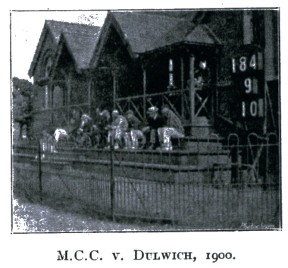 In 1899 a match v. Corpus Christi, Oxford, was started, which has been lost
once, won once, and drawn once. Two of the School matches are played at
home, and two away, changing in alternate years. Thus, one year Bedford
and St. Pauls are played on their grounds, and Tonbridge and Brighton
on the Dulwich ground, and in the following year vice versa.
Tonbridge is usually considered the match, though St. Paul’s
have been victorious for the last five years.
In 1899 a match v. Corpus Christi, Oxford, was started, which has been lost
once, won once, and drawn once. Two of the School matches are played at
home, and two away, changing in alternate years. Thus, one year Bedford
and St. Pauls are played on their grounds, and Tonbridge and Brighton
on the Dulwich ground, and in the following year vice versa.
Tonbridge is usually considered the match, though St. Paul’s
have been victorious for the last five years.
Besides these matches, Mr. J. Douglas brings scratch teams against the Eleven at the beginning of the season.
The “Under Sixteen” team, or Colts’ team, plays an annual match with the Haileybury Colts, so far without having won it. A Colts’ team is a most beneficial institution. No School complete without it.
Looking back to the past, Dulwich cannot claim so many names well-known in the cricket-field as some other schools. The average Dulwich cricketer is a useful member of his College team or his club, but seldom aspires to county matches. Middlesex, of course, is an exception, for on occasions both the Douglases, C. M. Wells, and J. M. Campbell appear in the team at the same time, while the Douglases and Wells are fixtures. If an old Alleynian does find a place in a county team, it is generally either Surrey, Middlesex, or Kent. F. P. Knox, N. Miller and H. O. Dolbey figure occasionally for the first, and F. D. Browne for the last. L. Jackson and L. S. Wells have played for London County in a first-class match.
But, as a general rule, Dulwich will be found in a comfortable middle position, making its fifty for its club, or its college, or its regiment.
O. Haigh.
Entered by Wodehouse in Money Received for Literary Work; the pseudonym “O. Haigh” is presumably intended to be understood as “O. A.” for Old Alleynian, i.e. an alumnus of Dulwich College.
 Madame Eulalie’s Rare Plums
Madame Eulalie’s Rare Plums